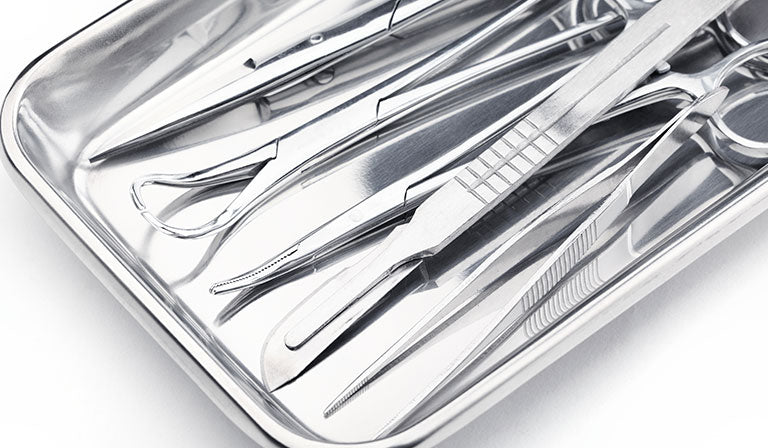

· By Trevor Horne
List Of Metals Commonly Used For Surgical Instruments
In the medical industry, a lot of thought and consideration goes behind deciding what materials to use for surgical instruments. After all, surgical instruments play a huge role in surgeries and using the wrong materials could lead to unimaginable consequences.
Most Common Metals for Surgical Instruments
The most commonly used metals for surgical instruments are titanium, stainless steel, platinum, tantalum and palladium. Materials used in the production of surgical instruments must hit a very strict set of standards. The metal must be malleable such that it can be shaped without resulting in flaws. However, it cannot be too malleable as the metal will need to be able to hold its shape after the manufacturing process. Depending on what the instrument is used for, the metal may also need to be ductile enough, as a lot of surgical instruments are very thin and long.
Surgical instruments are also required to have a satin finish while staying tough. This ensures that the instrument can be cleaned easily and will not become a breeding ground for bacteria. This is important in order to prevent infection from occurring. The metal will also need to be unreactive with the human body so as to prevent metal contamination from occurring when the metal comes into contact with the internal body.
Not all metals are suitable to be manufactured into surgical instruments. Often, surgical instruments are produced from metal alloys. One of the most ideal choices is stainless steel, but there are also other alternatives.
Using Stainless Steel to Manufacture Surgical Instruments
One of the most common materials used in the making of surgical instruments is stainless steel. This type of metal contains varying amounts of chromium and nickel, which determines its overall resistance to corrosion. Layers of chromium provide a layer called passive layer which is responsible for its corrosion-resistant property. Stainless steel is tough and suitable to be used in the chemical industry. Furthermore, stainless steel is able to withstand high temperatures of up to 400 degrees Celsius, meaning that sterilizing it in an autoclave of 180 degrees Celsius will be no problem as well. Stainless steel surgical instruments are non-magnetic, which means they can be safely handled in operating rooms that have a magnetic field of ~1.5 Tesla, e.g., from an MRI. Stainless steel is also rust-resistant and protects against corrosion. These surgical instruments won't be heated due to radio frequency power deposition or experience unwanted movement. For surgical instruments, the minimum modulus is 100 Gpa.
Using Titanium to Manufacture Surgical Instruments
Titanium alloy is a newer material used to make surgical instruments. Titanium has superior strength that is comparable to carbon steel. It is also completely corrosion resistant. Although titanium is extremely strong, it is also a flexible metal that is a lot lighter than steel. As a light metal, it helps to prevent surgeon fatigue during a surgery. Titanium is also known for its anti-glare property.
Titanium is the perfect material for both implants and surgical instruments. As titanium is able to fuse well with human bones, it has become the top choice for orthopedic rods, plates, pins and even dental implants. It is also able to withstand high temperatures of up to 430 degrees Celsius, and does not contract or expand as much when cooled or heated.
ProNorth Medical Corporation Offers Reliable Surgical Instruments
If you are on the lookout for good quality surgical instruments made of top grade metal, you have come to the right place. Here at ProNorth Medical Corporation, we stock a wide range of medical supplies and you will be able to find the surgical instruments that you need here. Feel free to contact us to find out more today!